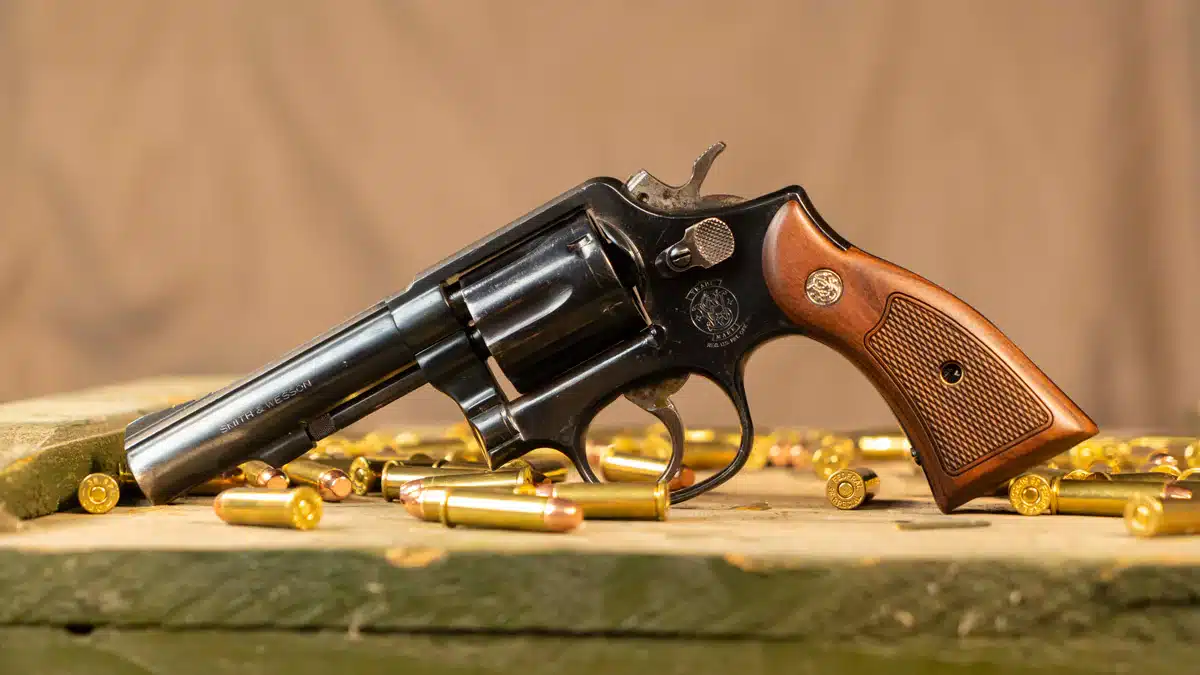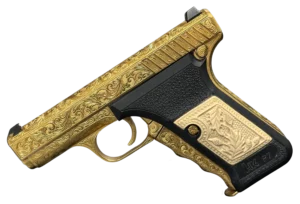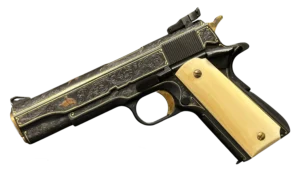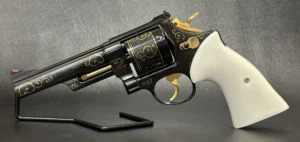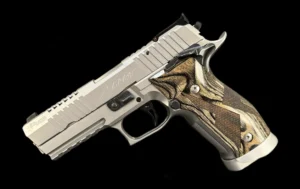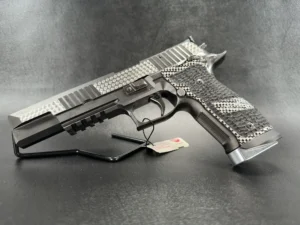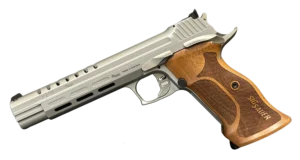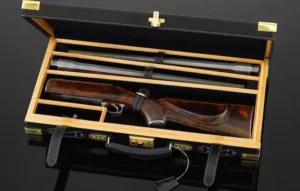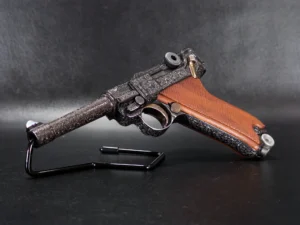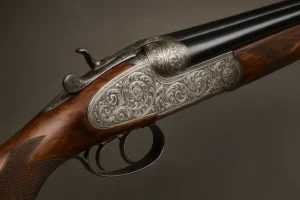Key Takeaways:
- The Model 10 Changed the Game — Quietly but Completely: Sometimes innovation doesn’t arrive with fireworks. The Smith & Wesson Model 10 didn’t just add a swing-out cylinder — it redefined how revolvers worked. It wasn’t flashy, but it was smart. The kind of smart that lasts over a century. What felt like a small mechanical tweak back in 1899 ended up setting the standard for revolvers for generations.
- Built for the Job, Trusted for a Lifetime: Whether it was mud-soaked trenches in World War I or a downtown beat on a rainy Tuesday night, the Model 10 kept showing up and doing its job. It earned its reputation the old-fashioned way: through grit, reliability, and dead-simple mechanics. No wonder police departments and militaries around the world kept it in service for decades.
- It’s More Than a Revolver — It’s a Symbol: You’ve seen it in movies. You’ve read about it in detective novels. The Model 10 isn’t just a firearm — it’s a cultural touchstone. It stands for reliability, authority, and the kind of craftsmanship that makes you nostalgic even if you’ve never held one. It’s not just part of firearms history; it is firearms history.
Some firearms earn their place in history by doing one thing exceptionally well. The Smith & Wesson Model 10? It rewrote the playbook.
At a glance, it might look like just another six-shot revolver. But dig a little deeper, and you’ll find a revolver that quite literally changed the way handguns were made, used, and thought about. Originally launched back in 1899 under the rather clunky name “Smith & Wesson Hand Ejector Model 1899,” this was no ordinary sidearm. It was a bold move away from the slow, awkward loading methods of the past. That new side-swing cylinder? Revolutionary.
This wasn’t just about shaving a few seconds off reload time. It was about rethinking how revolvers functioned altogether. And Smith & Wesson nailed it.
Not Just Built — Built to Last
The Model 10 didn’t get by on good looks alone (though let’s be honest, it’s got that classic revolver silhouette that’s hard not to love). It was engineered with rugged precision. The swing-out cylinder made reloads faster, yes, but it also introduced a level of mechanical simplicity that was easy to maintain — a big deal when you consider how gritty battlefield conditions could get.
Unlike older top-break or gate-loading revolvers that demanded more patience than practicality, the Model 10 let you dump all six spent cartridges at once and get back in action fast. For soldiers, police officers, or anyone who didn’t have the luxury of time, that mattered.
This revolver wasn’t just functional — it was dependable. It became the gold standard by which other revolvers were measured. Durable enough for war, simple enough for beat cops, and accurate enough to inspire confidence.
The Sidearm That Went to War — and Kept Working
When World War I broke out, plenty of weapons saw action. Few earned the respect the Model 10 did. Under the U.S. Army designation “M1917,” this revolver found its way to the trenches, where it proved tough enough to keep working through mud, rain, and chaos. Think about that: in the age of bolt-action rifles and early machine guns, a six-shot revolver still held its own.
Its swing-out cylinder was a godsend when you needed to reload under pressure, and its rugged frame could take a beating without giving up the ghost. Soldiers appreciated that kind of reliability — and commanders did too.
But the Model 10’s story didn’t end with the Armistice.
After the war, it found a new life in law enforcement. And not just in the U.S., either. Police departments across the globe adopted it. Why? Because it just worked. It didn’t jam, didn’t fall apart, didn’t require a gunsmith on speed dial. Officers could carry it for years, clean it with basic tools, and still count on it when things got ugly.
It wasn’t flashy, but it didn’t need to be. Like a well-worn pair of boots or a trusted watch, the Model 10 earned its place through sheer dependability.
Built for the Job, Not Just the Showroom
Let’s be honest: early 20th-century firearms weren’t always user-friendly. But the Model 10? It felt intuitive. It had a certain mechanical honesty about it — like every click and motion was designed with the shooter in mind.
One of its greatest innovations, of course, was that swing-out cylinder. It didn’t just speed up reloads — it completely changed how shooters engaged with their revolvers. Before this, loading a revolver could feel like trying to thread a needle in a windstorm. With the Model 10, it became a smooth, almost effortless process.
And that’s not all. The Model 10 came in different barrel lengths, which might not sound exciting today, but back then, that level of customization meant you could tailor the gun to your exact needs. The heavy barrel variant, for example, was beloved by law enforcement for the added control and accuracy it offered — especially during those tense, split-second decisions on the job.
Smith & Wesson didn’t stop improving the design either. Over time, they upgraded the ejector system, streamlined the thumb latch, and tightened up tolerances to make the gun even more durable. Every tweak had a purpose — usually based on real-world feedback from people who depended on this gun day in and day out.
More Than a Gun — A Pop Culture Icon
Now here’s where things get really interesting. The Model 10 didn’t just serve in wars or ride on the hips of beat cops — it became a cultural icon.
Seriously, try to name a detective movie, noir thriller, or police drama from the mid-20th century that didn’t feature a revolver like the Model 10. It was the sidearm of choice in countless films and TV shows, not because it was the most high-tech or cutting-edge, but because it symbolized something deeper: order, responsibility, authority.
This wasn’t the revolver of the outlaw — it was the revolver of the lawman. The good guy. The steady hand in a shaky world.
You saw it in the hands of fictional detectives cracking tough cases, and in historical photos of real officers walking the beat. Its unmistakable silhouette became shorthand for law and order — even to folks who didn’t know much about guns.
Collectors today still go crazy for vintage Model 10s. Why? Partly because of the stories behind them. These guns have history etched into every worn blued finish and smooth trigger pull. Some served in wars, others sat in police lockers for decades, and a few might’ve even protected entire neighborhoods.
Still Standing, Still Relevant
With so many high-tech handguns on the market today — polymer frames, red dot optics, double-stack mags — it’s fair to ask: does the Model 10 still matter?
Honestly? It does.
Sure, it’s not as flashy as a striker-fired semi-auto with all the bells and whistles, but that’s kind of the point. The Model 10 isn’t trying to keep up with trends. It’s still here because it doesn’t need to change. Its mechanical simplicity and dead-on reliability make it a favorite among revolver enthusiasts and new shooters alike.
For folks just learning the basics of shooting, the Model 10 is a phenomenal teacher. It forces you to focus on fundamentals — grip, sight alignment, trigger control — without overwhelming you with features. For those seeking a dependable home defense revolver, it still holds its own. Six shots of .38 Special from a gun you know will fire when you need it? That’s peace of mind you can’t put a price on.
Additionally, there’s a certain pride in owning a piece of history that remains as functional today as it was 80 years ago. It’s like driving a perfectly tuned classic car — it may not have a touchscreen, but you feel every part of the machine working with you.
A Legacy Carved in Steel
The Smith & Wesson Model 10 didn’t become a legend overnight. It earned that title — slowly, steadily, and honestly. Through two world wars, countless police shifts, and decades of cultural representation, this revolver built a legacy not on gimmicks, but on trust.
It’s not just a piece of old hardware. It’s a testament to good design, smart engineering, and the kind of craftsmanship that doesn’t need a refresh every year. You could pick one up today, and it’d still feel right at home, just like it did back in 1899.
That’s the real magic of the Model 10. It’s not frozen in time. It continues to live, breathe, and function — not as a relic, but as a reminder that sometimes, the simplest tools are the ones we end up trusting the most.
And let’s be real — in a world full of disposable tech and short attention spans, there’s something deeply satisfying about that.
Frequently Asked Questions
Well, where do we begin? The Model 10 wasn’t just a new revolver—it was a turning point. When it debuted in 1899 with its swing-out cylinder, it solved a significant problem: slow and clunky reloading. That one design shift made revolvers faster, simpler, and more practical. It’s no exaggeration to say the Model 10 set the blueprint for just about every modern double-action revolver that came after it.
Absolutely. It served in both World Wars, most notably as the U.S. Army’s M1917 during World War I. Soldiers liked it because it was reliable and easy to reload, even under the worst battlefield conditions. It wasn’t just a backup weapon—it was a lifeline when things got dicey.
Because it worked. Plain and simple. Cops needed a sidearm that was easy to maintain, wouldn’t jam, and could handle daily use without falling apart. The Model 10 checked all the boxes. Its heavy barrel gave it a nice balance, and its simplicity meant even departments with tight budgets could keep them in good working order for years.
You’d be surprised. While it’s no longer the go-to choice for most modern departments, it’s still available. Some folks keep it for home defense, and plenty of revolver enthusiasts love shooting it at the range. It’s also a great teaching tool for new shooters who want to understand the fundamentals without dealing with complicated mechanisms or electronic add-ons.
It’s chambered in .38 Special, which has been around almost as long as the revolver itself. That cartridge strikes a nice balance—enough stopping power for serious work, but soft enough recoil for comfortable shooting. For target practice or self-defense, it still gets the job done.


